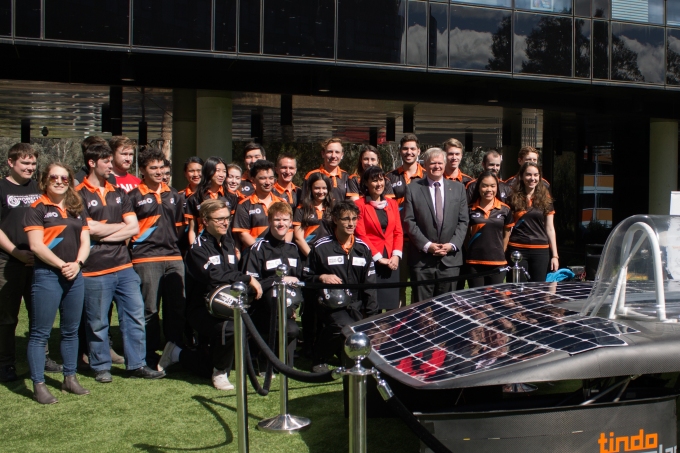Students from The Australian National University (ANU) have launched their first high-technology solar car to compete in the World Solar Challenge from Darwin to Adelaide.
The MTAA Super Charge, named for its major sponsor Canberra-based superannuation fund MTAA Super, has cutting-edge solar panels and Lithium ion battery technology to power a highly-efficient electric motor.
The 30 students from the ANU Sol Invictus team will compete in a 3,022km race from Darwin to Adelaide from 8-15 October.
Engineering student and Sol Invictus project lead Emily Rose Rees said it was exciting to be only days out from the challenge.
“It’s been especially difficult because it’s the first time we’re doing this and we don’t have a previous car to build on or previous team members for advice. But it’s exciting because we can forge our own path,” said Ms Rees.
“I want to thank everyone in the project who has put in so many hours to ensure we’re ready to take the start line. “Now we can go and see how we compare to all the other teams. Our aim is not to win but cross the finish line.”
Ms Rees thanked everyone who has made the project possible including major naming sponsor MTAA Super, and the ACT Government.
“The generous support from MTAA Super has been crucial to get us and our car, the MTAA Super Charge, to the starting line,” she said.
The team has worked tirelessly over the past two years to design and build a solar vehicle, raise sponsorship, and manage manufacturers, media, sponsors, academics, and students. “This project is unique because it’s greater than just an engineering project. It involves everything from project management, marketing and managing manufacturing and relationships with sponsors,” Ms Rees said.
ANU Vice-Chancellor Professor Brian Schmidt congratulated the students for making their ideas a reality with the completion of the Sol Invictus car.
“It’s an amazing challenge and I wish the students all the best for the gruelling race,” Professor Brian Schmidt said. “On behalf of the university we are immensely proud of all the students who have worked on this project.”
The Bridgestone 2017 World Solar Challenge is a biennial race for solar powered cars. The event attracts competitors ranging from universities such as Stanford, MIT and Cambridge through to technical institutes and private enterprises. Companies such as Volkswagen, General Motors, Ford and Panasonic use the race as a testbed for their new technologies and components.

